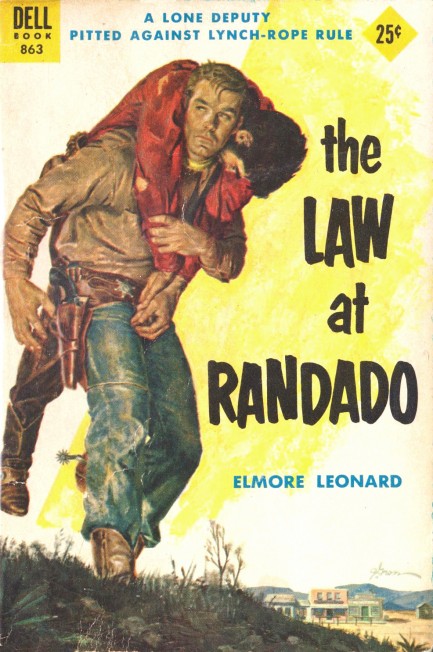| Vintage Pulp | Feb 1 2021 |

This is where being deputy in a one-horse town really sucks.

Elmore's Leonard's second novel The Law at Randado was published in 1954, and it debuted in paperback as this Dell edition with evocative George Gross cover art. Leonard wrote scores of fascinating characters during his long career. The villain here is yet another. Arizona cattleman Phil Sundeen inherited his wealth but pretends he earned it. Though he doesn't truly have a head for business the sheer size of his fortune prevents his numerous failures from ruining him. He commits transgressions that range from the rude to the unethical to the outright illegal. Men work for him knowing they'll eventually be humiliated or cheated, but they tell themselves that maybe there's a way to benefit from the relationship before it implodes.
When Sundeen's stupidity and vanity catalyze a deadly mob, deputy sheriff Kirby Frye wants to hold him to account. Though Sundeen encouraged the chaos, rather than physically taking part, there's no doubt he's responsible for the deaths. But most of the people in the town of Randado defend Sundeen. They all harbor fantasies that by staying on his good side fortune will one day smile upon them. His inner circle protect him, but they know he's wrong. They've gained considerable prestige clinging to him, but they try to make him face the reality of his situation anyway, only to learn that their enablement of him—and the enablement of all the sycophants who came before them—have warped Sundeen's sense of reality:
Sundeen looked up now, faintly grinning. “R.D., you old son of a bitch, you telling me [I'm] wrong?
“I'm facing the facts!”
“Facts don't mean a thing.”
“They do when you're faced with them!”
“I don't see 'em facing me. George, you see any facts facing [me]?”
And presented with this, Sundeen's enablers toss what remains of their integrity into a ditch. In public they claim his obvious crimes are not crimes at all, but they know they're lying, and in private they realize he will only get worse. So does Deputy Frye, which is one reason he's determined to apply the law to Sundeen, same as anyone else. His legal authority comes straight from the county seat in Tucson, but that authority means little to a group willing to see their meal ticket as oppressed by an illegitimate government. Frye has no inkling of where his ideals of evenhanded justice will lead, or what they will cost.
Elmore Leonard was a clever conceptualist—one of the best. The Law at Randado is at its core a tale of order versus chaos, central government over local law, and of whether people believe in the oft-cited principles of what America claims to be. When push comes to shove, those who support Sundeen want those principles binned. Even Frye's girlfriend wants Sundeen to be given a pass, and not just because her father is one of Sundeen's clan. She believes what other townspeople believe: that politicians in Tucson have no right to tell people in Randado what to do. Frye's stubborn insistence on law and order is at first an irritant to Sundeen, then an affront, then a legitimate threat that must be destroyed.
One magical aspect of fiction is that, in skilled hands, what seems murky in real life can be made utterly clear on the written page. Elmore Leonard died nearly a decade ago, so The Law at Randado isn't about events of recent years, but it's relevant because it's about the willingness of some to view the enforcement of the law as transactional. To such people the law is sacrosanct, but only as long as it's applied to others. Leonard explores a foundational civic paradox—that people accumulate power thanks to the stability and protection of the law, then suddenly believe the law exists only as a tool for their ambitions and desires. The Law at Randado explores that idea and does it exceedingly well.




































































